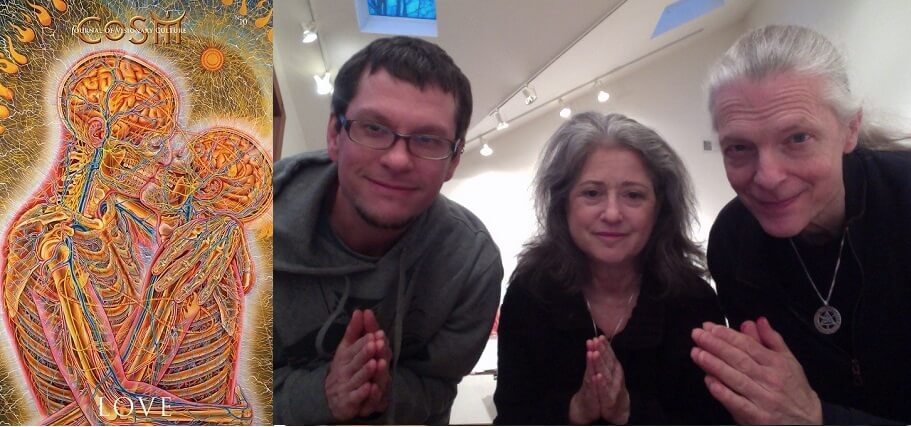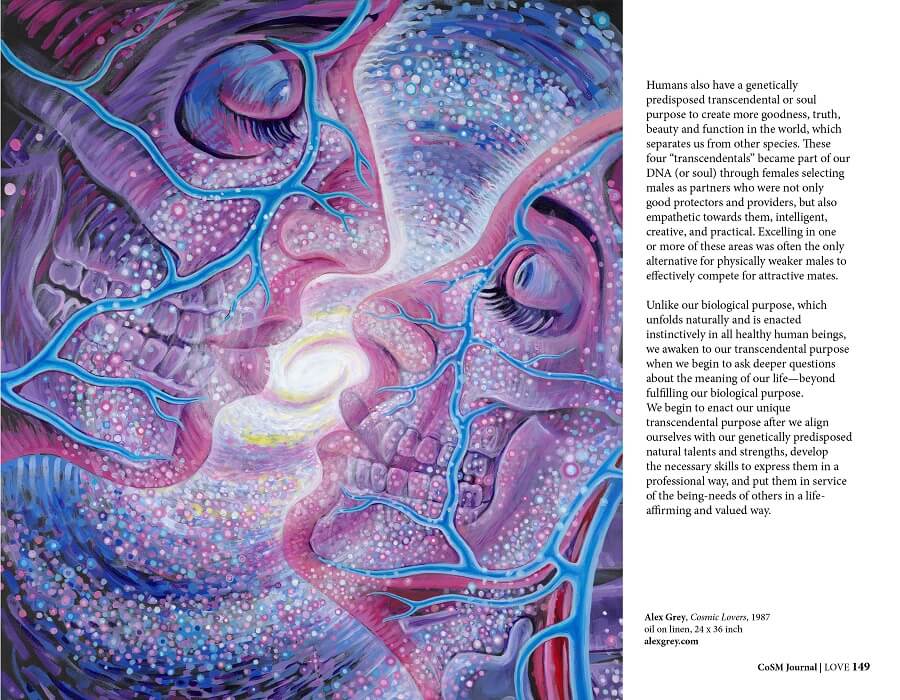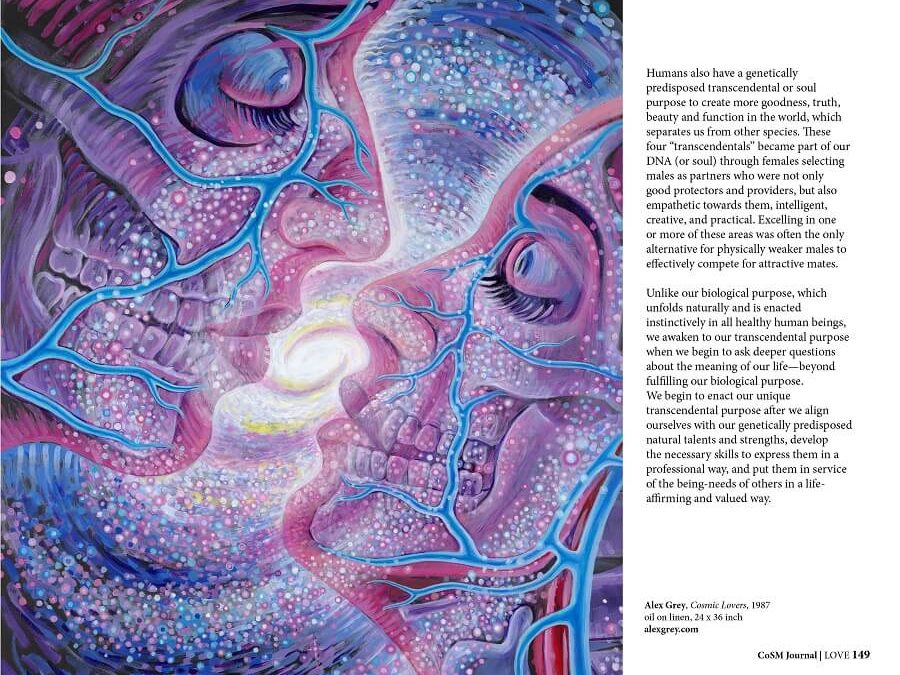I am very honored that world-renowned artists Alex and Allyson Grey invited me to contribute an article about the Dialectic of Love to their COSM Journal of Visionary Culture #10 about LOVE.
You can order your copy at https://shop.cosm.org/collections/books/products/cosm-journal-10
The article describes how love along the first six chakras shifts from asymmetrical, transactional, need-based love to symmetrical, transcendental, being-based Love when couples share their transcendental purpose–as Alex and Allyson so beautifully model for us.

When couples share a Transcendental Purpose their love goes beyond what best serves their biological purpose to survive, to form groups, to procreate, to raise their offspring, and to seek the optimal quality-of-life, as described in my blog post here.
Pictured below is the second page of the COSM article:

Transcendental Purpose:
I use this term as a catch-all phrase for the various names that people at different levels of consciousness, meaning-making structures, and spiritual awareness use to describe a purpose that goes beyond the egoic self, such as souls purpose, spirits purpose, unique purpose, higher/God’s purpose, true purpose, real purpose, authentic purpose, essential purpose, universe’s purpose, light’s purpose, or evolutionary purpose. In fact, the Purpose Guides Institute www.purposeguides.org features several prominent teachers who represent these various approaches to discovering our Transcendental Purpose.
The potential to awaken to and living our Transcendental Purpose is unique to humans, and individually determined through a combination of:
- Genes that predispose us for certain natural talents in kind and degree.
- Our physical and brain development, including gender.
- The family, social and cultural environment in which we grew up.
- Development of skills through learning and practicing, especially in younger years.
- Serving needs in a life-affirming way that is valued by others.
In short, our Transcendental Purpose is a combination of:
Genetic/Natural Talent(s) + Skills + Serving Needs + Providing Value to Others.
The most important insights are that (1) our Transcendental Purpose always creates more Goodness, Truth, Beauty, or Functioning that is put in service of others to make the world a better place, and (2) that people at all levels of consciousness development and spiritual realization can awaken to it, live it, and share it with a partner.
Awakening to our Transcendental Purpose
Unlike the trajectory of our Biological Purpose, which unfolds naturally and involuntarily under normal conditions in physically and psychologically healthy humans from gestation to death, we awaken to the fact that we have a Transcendental Purpose. This awakening either happens spontaneously through a personal insight or ah-ha moment, or is triggered by an external event that brings instant clarity about our role in creating a better world—beyond living our Biological Purpose—after it was brewing in our unconscious mind for some time. Other people awaken to their Transcendental Purpose gradually when living their Biological Purpose no longer answers the deeper questions of their existence, such as: “What is the meaning of life?” “Why are we here?” “Where do we come from?” “What are we to do?” “Why do we suffer?” “How can we be truly fulfilled and happy?” “What is my purpose?” “How can I contribute?” “Where will I go?” and “How will I be remembered?”
These questions often arise after a profound life-changing event, e.g., falling in love or having our heart broken; witnessing the birth of a child; having a spontaneous peak experience or spiritual awakening; being “high” during a drug induced state; having a vivid dream; breaking down because of a dramatic event such as the loss of a loved one or a near-death experience or a life-threatening illness; engaging with a spiritual teacher or teaching; working with a therapist or coach; meeting a wise person; attending a personal growth workshop or development seminar or; or reading a book about purpose like the one you are reading right now.
The true answers to the questions about our Transcendental Purpose and its genuine expression are, by definition, always life-affirming, in support of the healthy expression of the Biological Purpose, and in service to the welfare of others, and so mark a shift from hedonistic to eudaimonic forms of quality-of-life seeking.
To make these distinctions is absolutely crucial in order to differentiate our Transcendental Purpose from life-denying or destroying, narcissistic, egocentric, ideological, cynical, nihilistic, hyper-individualistic, extremist, or otherwise misguided actions in the name of following our bliss, doing what makes us feel alive, listening to some inner voices, performing God’s will, heeding a higher calling, or even allowing spirit, consciousness, or an evolutionary impulse or purpose to manifest through us in misguided ways.
Unfortunately, many otherwise useful purpose discovery methods and practices (which are described in detail in Sex Purpose Love page 229 to 272) fail to make these crucial distinctions about what we are truly born to do beyond living our Biological Purpose and provide no normative guidelines.
In fact, many villains such as Nazis, fascists, terrorists, serial killers, racists, misogynists, false spiritual teachers, and other people who willfully hurt and take advantage of others and destroy our environment in the name of some “divine order,” “higher power,” “deeper calling,” misguided Darwinian notion of “survival of the fittest,” “acting in one’s self-interest,” “me and my country first,” or even “higher spiritual” motives have used arguments of living their purpose to justify their harmful actions.
In other words, we can be at an advanced stage of consciousness development (including Integral or Transpersonal) and/or spiritual realization (including non-dual) and think we live our purpose, and still completely fail to create more goodness, truth, beauty, and functioning.
Only people who have been disenfranchised from living their Biological Purpose in healthy ways, and did not awaken to their Transcendental Purpose, and those with deep childhood wounds and severe mental illnesses—all of which, as we said above, is not their fault—act in life-denying or destructive ways and deserve our compassion as well as support to end their damaging actions, or must be curtailed by, what non-violent/compassionate communication teacher Marshall Rosenberg called, “protective force,” which he differentiated from “punitive actions.”
Interestingly, we have seen throughout most of human history that groups, movements, ideologies, religions, philosophies, and societies that were inspired and lead by visionaries who lived their Transcendental Purpose prevailed over those who spread evil, falsehoods, ugliness, and destruction, even though sometimes it took several decades or even centuries, and there have been notable exceptions … after all, the winners usually write the history books.
Mahatma Gandhi famously said: “When I despair, I remember that all through history the ways of truth and love have always won. There have been tyrants, and murderers, and for a time they can seem invincible, but in the end they always fall. Think of it—always.”
This premise will hold true, as long as enough women chose and procreate with men who create more goodness, truth, beauty and functioning by living their Transcen
Spiritual vs. Purpose Awakening
There is an important difference between the typical Eastern notions and practices that potentially lead to spiritual awakening, and the Western processes of identifying and living our Transcendental Purpose. Eastern practices traditionally have an inward focus on eliminating suffering through detachment from our identification with gross material objects and the physical body, the subtle mind and thoughts, and causal feelings and emotions through Ego transcendence and exclusion of the so-called “lower realms” and living a virtuous life, for example, by following the eightfold path in Buddhism.
At the same time, Eastern traditions frequently miss the modern Western discoveries of the unconscious mind and developmental stages of consciousness. Their spiritual focus on the self often leads to the hedonistic, hyper-individualistic New Age narcissism in Westerners (seeking pleasure, avoiding pain, believing that everybody creates/manifests their own reality, loving one’s self instead of loving others, tuning out what is going on in the world, etc.) and spiritual bypassing (repressing negative emotions, ignoring problematic psychological and developmental issues, remaining in a childish magical stage of development, and avoiding committed intimate love relationships and pro-creation in the name of being enlightened or becoming whole and complete in oneself). Both, the spiritual focus on the self and spiritual bypassing can turn into the very opposite of living our Biological and Transcendental Purpose.
In contrast, after we awaken to the fact that we have a Transcendental Purpose, we shift towards an outward focus that asks deeper questions about how we can serve the needs of others in life-affirming ways that are valued by them, after we developed the necessary skills that are aligned with our genetically predispositioned natural talents.
While a spiritual practice of Ego transcendence can be helpful in awakening to and identifying our Transcendental Purpose by removing layers of our false separate sense of self that are not in alignment with living our Transcendental Purpose, enacting it also requires us to develop a healthy sense of self or Ego through learning, healing, growing, and skill development.
Four Types of Purpose Discovery Methods
There are four general types of methods that have been developed by purpose guides to support us in discovering our natural talents and resulting Transcendental Purpose.
We call these four discovery method types (1) Autobiographical, (2) Absent, (3) Ego-Transcending, and (4) Ego-Affirming.
Method Type 1: Autobiographical Methods
Autobiographical methods work well for people who have had a multitude of life experiences, such as jobs, relationships, lifestyles, living in different places, etc., with their natural ups and downs to draw from.
Autobiographical methods are just like they sound: creating your own autobiography as a means to examine your life and extract purpose.The advantage of autobiographical methods to identify talents and purpose is that they are relatively simple, can often be performed without professional help, can be supported by online tests (see below), and don’t take much time and money. They typically use both hidden clues and obvious evidence.
Method Type 2: Absent Methods
Absent methods are focused on figuring out what is missing, looking for holes, things that are absent.
This second group of methods allows us to discover latent natural talents that were once potentials but the skills that would have allowed us to identify and express them are absent. These methods go deeper than autobiographical methods by attempting to tap into the unconscious mind through psycho-spiritual practices. These can include Prayer or “conversations with God,” guided or self-directed meditations to quiet the mind, intuitive and creative journaling, art therapy, eco therapy, dream analysis, hypnotherapy, Shamanic medicine journey work (sometimes supported by drugs such as ayahuasca, ketamine, or magic mushrooms), and supervised vision quests. Absent methods attempt to uncover unrealized potentials by reaching into our unconscious mind to connect with what deeply resonated with us and gave us joy as young children before a strong sense of a separate self and defense mechanism developed.
Method Type 3: Ego-Transcending Methods
Ego-transcending methods work best for people who have never felt a deep sense of purpose or meaning in their lives, or don’t trust any methods that rely on the self/ego, psychology, rationality, or the unconscious mind to identify their purpose, or who feel deeply resonant with and connected with the natural world, and therefore can’t relate to the autobiographical and absent methods that we covered above.
As the name implies, ego-transcending methods aim at going beyond our culturally conditioned separate sense of self, so that our Transcendental Purpose arises naturally moment-to-moment without being filtered or judged by the self.
Method Type 4: Ego-Affirming Methods
Contrary to ego-transcending methods, ego-affirming methods suggest that we are already radiant and powerful beings and simply need to remove the veils that prevent us from shining our light into the world. Proponents of ego-affirming methods state in one way or another that we are all “great talented human beings” who are “powerful beyond measure and can attract anything we want into our lives” but don’t know it, repress it, or are afraid of it, and thus are not living our “limitless potentials” or “higher purpose.”
The upshot of these approaches is that they don’t require much psychological healing, personal growth, spiritual awakening, or additional skill development. They simply require that we bolster our ego or self-confidence and shine our light into the world unhindered. These methods can therefore work well for people who have indeed developed their natural talents through the practicing of skills to a professional level, but who feel uncertain, insecure, ashamed, afraid, or undeserving to fully express them.
Sex Purpose Love covers the topic of our Transcendental Purpose in great detail from page 137 to 320 and in over 250 endnotes.

